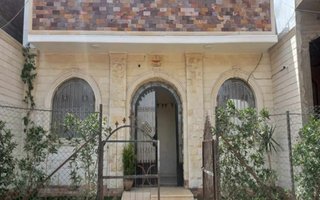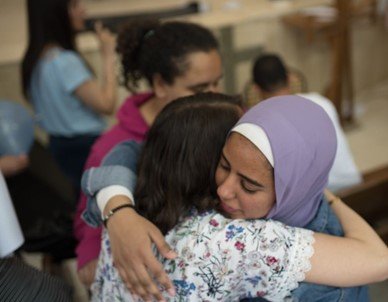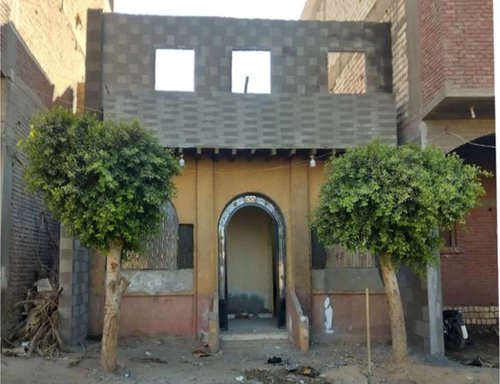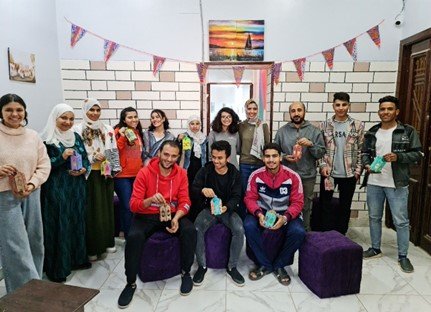El Safina: A safe haven in the midst of chaos
Sylvia Khela describes the founding of El Safina, the first cultural centre in Balansura, a small village in Minya, Egypt, which aims to foster peace, promote art and psychosocial support.

El Safina is an Arabic word that means ‘the ship’. The founders of the El Safina project chose this name to represent a Noah’s Ark for the people of Balansura, a small village in Minya, Egypt. El Safina is the first cultural centre in the village, which aims to foster peace, promote art and psychosocial support.
For years, upper Egypt has been marginalised compared to lower Egypt, which made it prone to conflicts, poverty, and inequality. What is even worse is that for the recent four decades, Minya, in particular, has been recognised as a hotspot for violence between Muslims and Christians. Many of its villages suffer from passive peace – as you walk into the village you will clearly see the state of isolation between the Christian neighbourhoods and the Muslim ones, living side by side but rarely interacting with one another.
A turning point
Balansura was no different. A recent rumour intensified the situation among locals. As a result, people on both sides resided again to their own bubbles and became concerned to interact with one another.
The demography of the village is simple, it had three churches (one Coptic Orthodox, one Coptic Catholic, and one Evangelical church) and five mosques, yet it did not have a single common space for both groups.
The general atmosphere in Balansura before the establishment of El Safina was quite depressing. Young people and children spent most of their time hanging out in the streets or in coffee shops – that is dominantly for males. Sadly, women and girls mainly stayed at home, suffering from different types of abuse and oppression.

Two young ladies from Balansura greeting each other after the workshop inside the church hall.
The churches engaged the Christian youth in various kinds of social activities. One day, against all odds, the Evangelical pastor, opened his church up to all the young people of different faiths and backgrounds to attend dialogue workshops and play board games and table tennis in the church.
He allowed them to stay long as they wanted. Now, this has helped the youth feel a sense of ownership towards the space.
In his attempt to bridge the gaps between the young people, the pastor invited a group of peacebuilders from Cairo to visit his parish, spend time with the community and share their experiences during the Sunday sermons.
Nevertheless, when the rumour spread, the few Muslims who were open to attending activities at the Evangelical church found themselves in a tough situation. Facing bullying from their community for entering the church, they started to withdraw and expressed their sorrow that the church is considered not an appropriate place to meet for activities anymore.
Transformation inside and out


The above photo shows El Safina building before the renovation and the below one shows it after the renovation.
From here came the idea of establishing El Safina cultural centre. The Evangelical Pastor sensed this need in the village and decided to take the risky decision of making safe space for the village youth.
With the help of the young people of his parish along with the support of a network of peacebuilders in Cairo, he took an old rickety building that originally belonged to the church, raised funds and renovated it. They made it into a common space where everybody is welcome, valued and appreciated.
El Safina is currently operating based on a down-top approach, where everyone has a role to play.
Volunteers come from different cities to deliver workshops and training. In turn, the young team of Balnsura – for the first time in their lives – are empowered to transfer the knowledge to their peers in the village.
Among the interesting initiatives that blossomed in Balansura were peace engineering workshops. where participants learned about a mix of peacebuilding, social responsibility and information technology. Over four days, they were immersed in real life situations and were given the chance to develop mobile applications to help in improve their village infrastructure. Today, there are three young people from Balansura who currently work as App developers using no-code platforms.

During the peace engineering workshop. Credit to El Safina team.
A new landscape of peace
One year on from its establishment, we can say that El Safina is dramatically contributing to changing the landscape of the village. Art, dance, Karate, psychosocial support groups, dialogue workshops and book exchanges are among the various activities that take place in El Safina and all have participants from both groups.
However, since most of the activities that are held there are quite new, and mostly based on volunteering efforts, the place still struggles to become financially independent from the Evangelical church. Nevertheless, it still contributes to social cohesion in Balansura, and setting an example for the nearby villages on how to take a path towards inclusion, cohesion and peace.

A Fawanes making workshop in the holy month of Ramadan, hosted by Karakeeb Team. Credits to El Safina team.
Its newness also means El Safina is still generating new ‘firsts’. For example, for the first time in the village, young Muslims and Christians gathered to create these beautiful Fawanees Ramadan (Ramadan Lamps) together in a fun and creative environment. These types of workshops strengthened the bonds between the young people of Balansura and furnished the road for more collaboration. The Evangelical Pastor – third from the left – always participates in their activities to lead by example.

A communication skills workshop hosted by Dialogue Ambassadors. Credit to El Safina team.
The creation of this safe space has been a success in and out of itself. It shattered the village stereotypes about both groups, paving the path for them to live together in harmony. A few years ago, it was something far from reality to see Muslims and Christians attending workshops and participating in different activities.
Today, you see them dance together, play together and, above all, dream together.

From ‘Echo’ performance inspired by the stories of ancient Egyptian heritage of wisdom, justice and knowledge. Credits to Medhat Eid and Ebram Emad.






